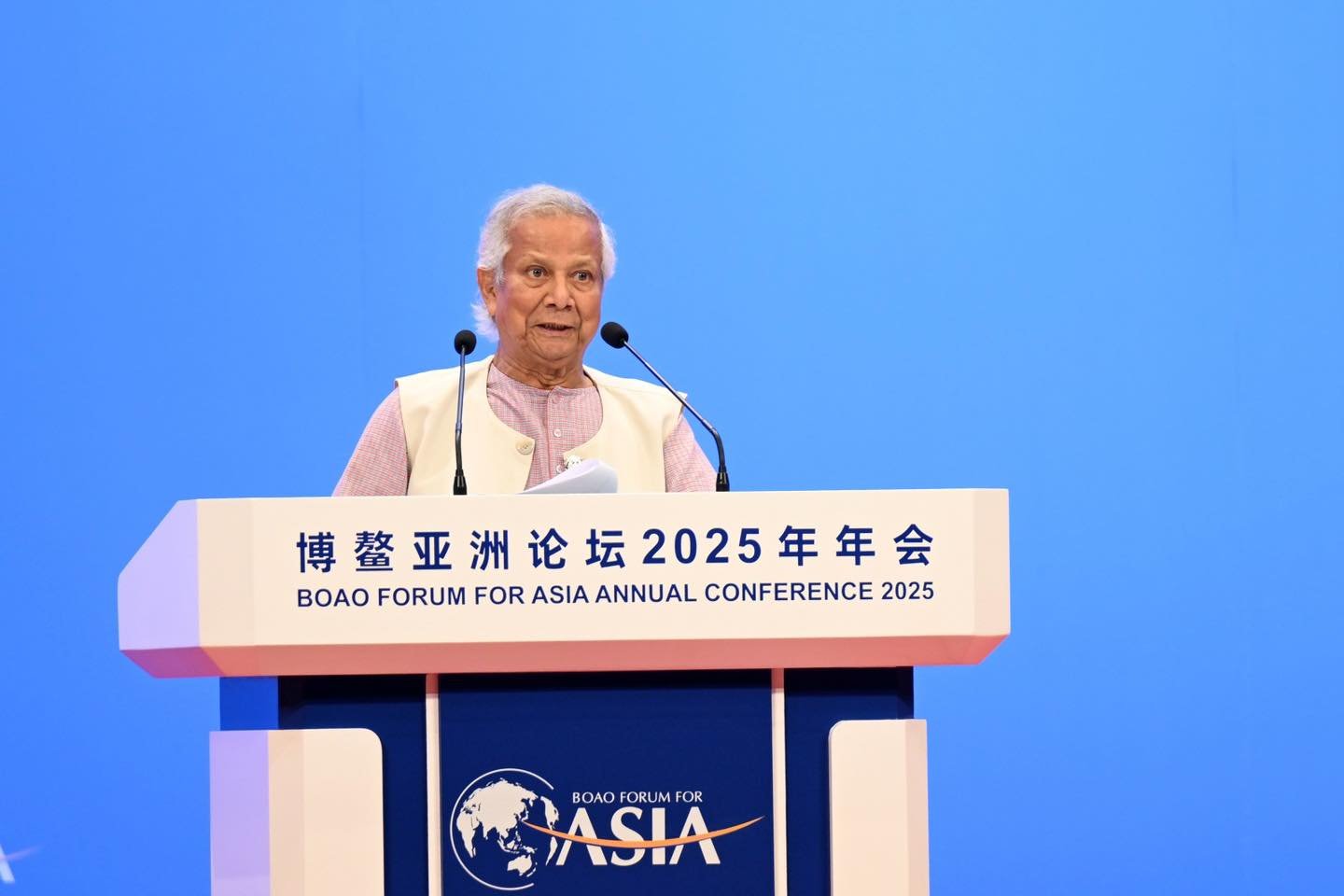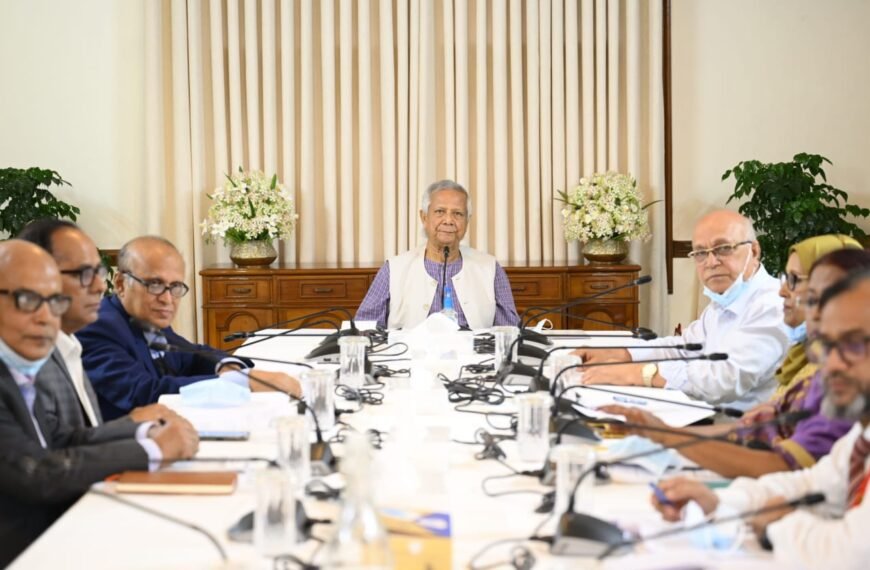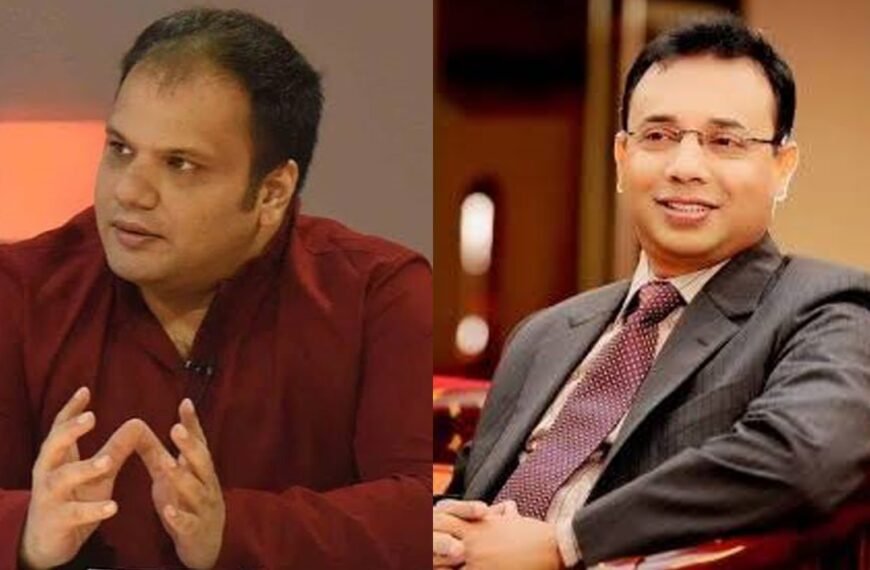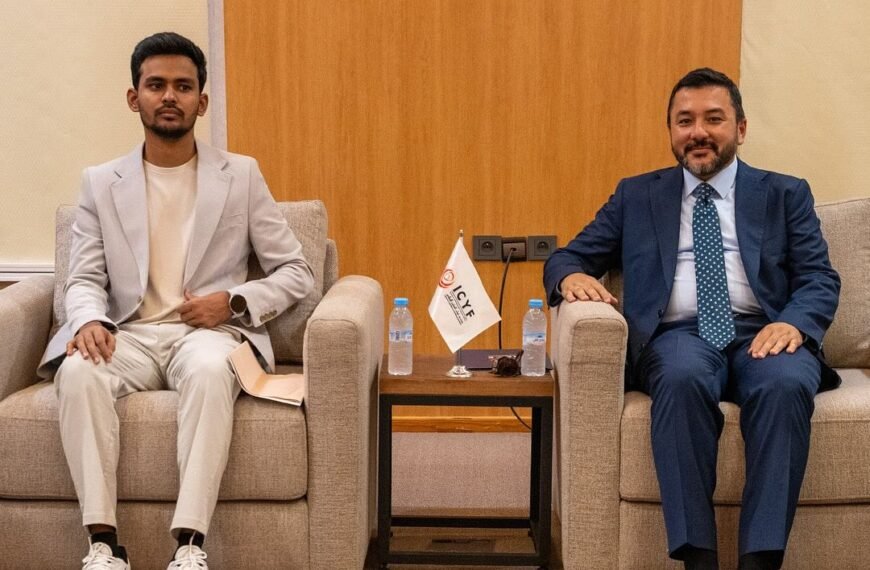Assalamualaikum! Good Morning/ Good Day!
Thank you for inviting me to share my thoughts at this forum on the timely theme “Asia in the Changing World: Towards a Shared Future.”
This forum takes place at a critical juncture. Global governance under multilateralism is being questioned. Geopolitical tensions are rising. Climate change is escalating. Debt burdens are unsustainable. Humanitarian crises are growing.
Political will for development cooperation is weakening. The world faces an alarming shortfall in collective action.
Asia, home to 60% of the global population and 55% of global GDP, is at the center of these changes. Emerging norms, regulations, and technologies are reshaping governance and economic policies.
Assumptions that shaped policies a decade ago are no longer relevant. The need for regional and global cooperation has never been more pressing.
In 2007, I attended the Boao Forum for Asia to share insights on microcredit.
Today, I stand before you in a different capacity, representing a Bangladesh that underwent a historic transformation in July-August last year. The world witnessed a people united against oppression and corruption.
Our youth and citizens demonstrated exceptional resolve and strength to redefine the future of Bangladesh. To restore public trust we have initiated critical reforms. Independent commissions have been launched to reform the electoral system, judiciary, civil administration, and law enforcement. These reforms, when implemented, will bring about fundamental transformation of our nation.
Excellencies,
As we build a new Bangladesh, we face multiple challenges which are shared by other Asian countries. In particular global financial market instability, political uncertainties, diplomatic tensions, and trade disruptions create volatility. Rising interest rates and debt servicing costs are deepening Asia’s debt crisis.
Despite global commitments to the 2030 Agenda, progress is slow. Only 24% of SDG targets have been met. Developing Asian countries face an SDG financing gap of 2.5 to 4 trillion US dollars annually. Beyond SDG financing, Asia also needs large-scale investments in infrastructure and economic diversification through
responsible financing.
Bangladesh has been a victim of corruption and illicit financial flows. These corrupt practices cost developing countries an estimated 1 trillion US dollar annually which is multiple times more than the total ODA they receive. Asia should stand united to establish a multilateral mediation mechanism for asset recovery and return.
Food security is under increasing pressure. Rising prices of essential commodities are straining household budgets, especially for low-income families.
Climate change and natural disasters are exacerbating this crisis. Strengthening food supply chains is essential.
Energy security is critical, especially for net-importing developing countries.
Energy supply disruptions drive inflation, economic instability, and debt distress. We must find sustainable energy solutions and scale up investments in renewables.
Investing in health and education is crucial for human capital development. A well-educated, skilled workforce drives economic growth and innovation. Countries that invest in universal healthcare see better economic productivity. Digital education and vocational training must be expanded to equip our youth for the jobs of the future.
Distinguished Audience,
Our civilization is at risk as we continue to embrace self-destructive economic values. The dominant economic model thrives on limitless consumption. It justifies over-extraction of resources and environmental degradation in the name of growth.
We must shift toward sustainable economic models that prioritize people and the planet over profits.
The climate crisis poses an existential threat to humanity. In Asia-pacific region, climate disaster-related economic losses are already enormous, which is equivalent to 65 billion US dollar. Climate-vulnerable countries like Bangladesh are forced to divert resources toward disaster response, limiting investments in productive sectors. We need new, additional, accessible, non-ODA, non-debt-creating, grant-based climate finance, with an equitable distribution between adaptation and mitigation.
Universal access to life-saving medicines and technologies must be guaranteed. The COVID-19 pandemic was a wake-up call, highlighting deep inequities in global health systems. Asia should take a united stance in the ongoing negotiation of the Pandemic Treaty.
Rapid strides in date driven technology, robotics, quantum computing and artificial intelligence, are shaping the world. Lower capability, capacity, and resource mobilization in Asia compared to advanced economies, could further widen digital divide. Data sovereignty and security remain critical concerns. If technology evolves irresponsibly, it could pose existential risks. Asia must close the digital divide and build regional capacity in technology, innovation and incubation.
Ladies and Gentlemen,
Asian cultural diversity, with its rich tapestry of languages, traditions, philosophies, and customs, is a testament to the resilience and creativity of human civilization. The philosophies of Islam, Confucianism, Buddhism, and Hinduism, among others, have shaped global thought, offering unique perspectives on morality, governance, and the human spirit.
Asia’s civilizations have flourished by embracing diversity. Over the centuries, the vibrant exchanges of cultural diversity has not only impacted the region but have shaped the world. Today, Asia’s cultural richness is a strength that drives its global influence. The melding of tradition and modernity, the respect for ancestral wisdom alongside cutting-edge innovation, creates a dynamic energy that propels the region forward while honoring its deep historical roots.
Asia’s demographic dividend presents immense potential. A growing workforce, particularly young people, can drive innovation and productivity. We must provide them access to finance for entrepreneurship and sustainable solutions.
Investing in human capital and an education system aligned with the evolving global job market will shape Asia’s future competitiveness.
Women’s labor force participation in Asia remains low. Gender gaps persist in leadership and decision-making. We must remove barriers to women’s economic empowerment and ensure equal access to opportunities.
In today’s poly-crisis world, wars and conflicts erode rights and disrupt economies. The genocide in Gaza continues despite global condemnation. The crisis in Palestine is not just an Arab or Muslim concern, it is a humanitarian issue. The continued tension in Ukraine is heavily tolling on global supply chain. The protracted crisis in Myanmar threatens regional stability.
For more than seven years, Bangladesh has been hosting over 1.2 million forcibly displaced Rohingyas who are Myanmar nationals. We continue to bear significant social, economic, and environmental costs. The UN Secretary-General recently visited the camps in solidarity. While global efforts are drastically shrinking but continuing, Asian leaders must come together to ensure their safe and dignified repatriation to their home country, Myanmar.
Distinguished Audience,
In this changing world, the destinies of Asian countries are intertwined. We must chart a clear roadmap for a shared future and shared prosperity. At this forum, Asia must step up and strengthen cooperation in four key areas.
First, Financial Cooperation. Asia must create a sustainable financing mechanism. Regional MDBs and similar institutions should lead this effort. We need reliable funds that address our challenges and meet our growing demands.
Second, Trade Cooperation. Asia remains one of the least integrated regions.
This weak integration stifles investment and trade. We must work to boost trade cooperation immediately.
Third, Food and Agriculture Cooperation. We must promote resource-efficient farming. Domestic production must be enhanced for food security. We need to reduce import reliance and achieve self-sufficiency. Expanding tech-based sustainable agricultural solutions and innovation in regenerative and climate-smart farming is key.
Fourth, Technology Cooperation. Asia must build a strong tech ecosystem, which should be restorative, distributive and inclusive. We need to share knowledge, data and invest in technology incubation and innovation. Collaboration on digital solutions will drive progress.
Finally, mobilizing intellectual resources and youth power must be at the centre of our collective actions. We must lay the foundation for a new civilization: a self-preserving and self-reinforcing society. We must create a counter-culture based on a zero-waste lifestyle. Consumption should be limited to essential needs. Our economy should focus on social business, which is increasingly regarded as to chart the future of business; where innovation, purpose, and responsibility converge. Boao Forum and other similar initiatives in Asia should enhance collaboration of youth and entrepreneurs to make Asia a better place for our generations to come.
As I mention always, every young person should grow up as a three-zero person: zero net carbon emissions, zero wealth concentration, and zero unemployment through entrepreneurship in social business. This is the shared future, we in Asia must create together.
Thank you all.
Source: From ‘Chief Adviser GOB’ Page.




